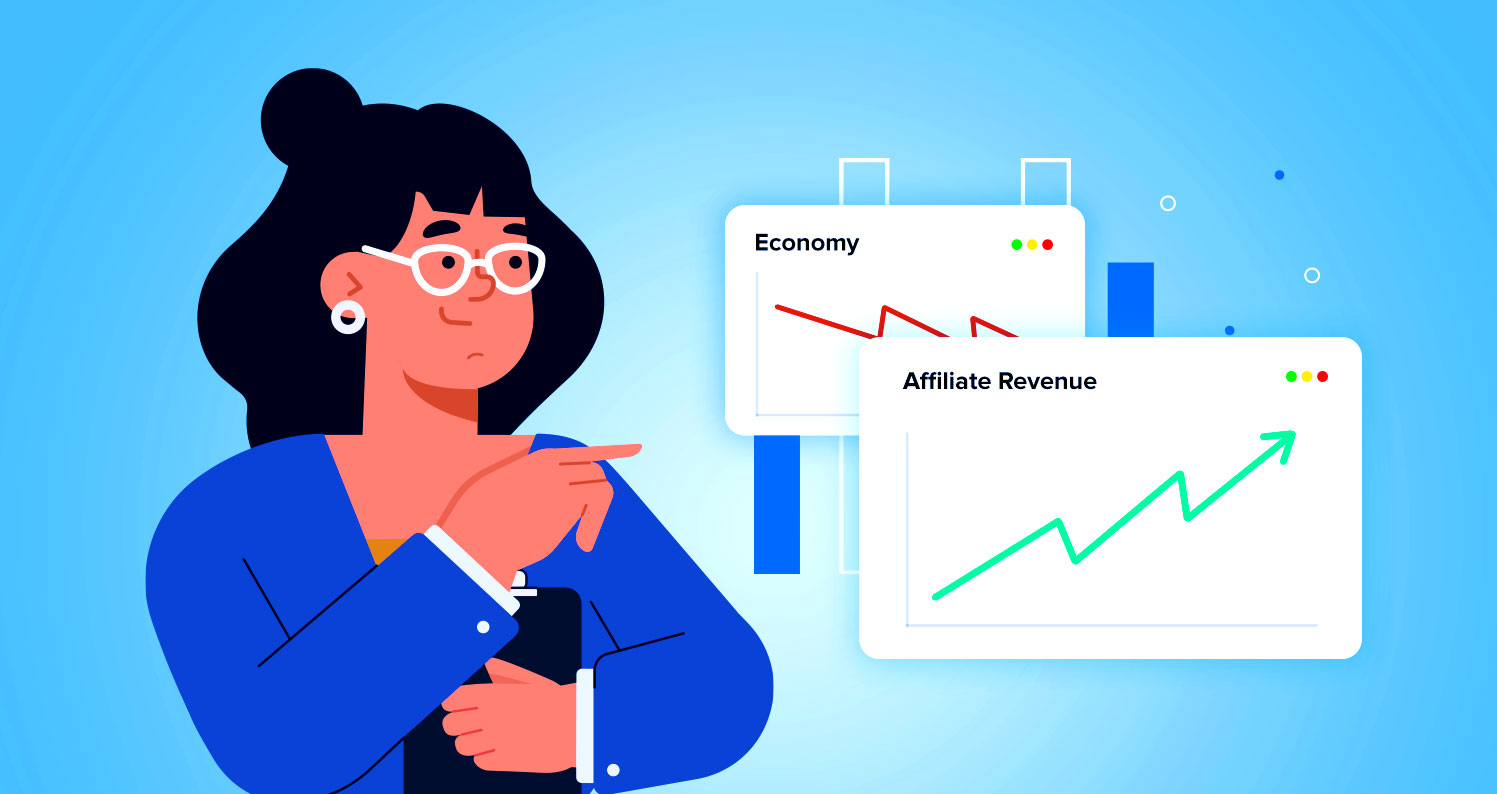Affiliate Resilience: Thriving in an Economic Downturn
Affiliate investment is among the strongest ways to grow your business during uncertain times. Learn why the affiliate channel excels during an economic downturn or recession.

As the economy contracts and businesses reassess marketing spend, affiliate marketing becomes one of the most efficient levers for advertisers to pull.
Its performance-based nature allows brands to allocate budget where it drives results, avoiding the risk and rigidity of traditional fixed-spend channels.
While a receding economy can have a profound impact on consumer behavior, the very nature of the affiliate channel is already positioned favorably against these changes.
How does a recession affect the affiliate marketing channel?
During recessions, consumer behavior adjusts rapidly. People grow more selective, scrutinize value more closely, and often delay purchases unless the perceived benefit outweighs the cost.
Affiliate programs, by design, are built to accommodate these shifts. Partners are quick to update offers, refine messaging, and align their promotional tactics to emerging consumer priorities without lengthy setup cycles or creative dependencies.
As consumers seek better deals and stretch their dollars further, affiliate marketing becomes the natural home for cashback placements, loyalty partnerships, and promotional exposure that meets customers where they are.
Why does affiliate marketing make sense during a recession?
Brands can set cost per action across nearly every dimension that matters—by partner, partner type, product category, or even promotional cadence.
That level of precision gives marketers complete control over how spend aligns with performance. You decide what outcomes are worth paying for and at what rate, adjusting to align with evolving goals or margin pressures.
Tactical adjustments, such as shifting commissions based on margin tiers, rewarding partners who increase average order value, or incentivizing bundle sales, can produce measurable impact.
These refinements can be implemented quickly and adjusted often, which is rare in traditional media but standard practice in affiliate.
What are the common mistakes to avoid in an affiliate program during an uncertain economy?
Economic pressure often leads to a narrower view of channel performance. There’s a temptation to chase the lowest cost per order, but this overlooks the role affiliate plays in shaping the broader buyer journey.
Programs that diversify their publisher mix to include a range of funnel stages typically endure market shifts better. Strong programs strike a balance between conversion and visibility, between the last click and the content that made it possible.
Time-based incentives, category-specific bonuses, and value-add offers like free shipping or extended returns can all increase urgency without eroding brand equity or price integrity.
This is also when performance consistency matters most.

Affiliate teams collaborate on data-driven strategies to optimize revenue performance in a shifting economy.
Affiliates have been a safe bet during other economic downturns.
During past downturns, deal and loyalty partners often outperformed other channels. This isn’t because they were immune to pressure, but because they remained flexible and close to the consumer mindset.
Product-focused content partners and SEO-aligned affiliates also help ensure long-term visibility, even if immediate conversion behavior slows.
Looking back at prior downturns, many of today’s top-performing affiliates found their footing during economic strain.
Coupon and cashback models scaled dramatically during the 2008 housing crisis, serving brands that needed reach without high upfront costs.
The COVID-19 pandemic underscored the same lesson: When ecommerce surged and traditional media paused, affiliate marketing provided brands with a way to stay visible and agile.
What are some examples of affiliate success despite a poor economy?
In one case, we guided a large kitchenware brand to year-over-year affiliate revenue growth of over 380% during the pandemic. This was accomplished after repositioning the brand’s content strategy around high-intent education and product discovery.
Another client in the beauty space was threatened by a highly promotional environment. We helped them increase revenue 42% by refining publisher tiers and shifting more investment into trusted editorial placements.
In the UK, one pharmacy brand we serviced saw a 300% lift. This was accomplished by layering cashback across core product lines and optimizing evergreen content tied to recurring purchase needs.
Of course, these aren’t the only clients we’ve led to success during uncertain economic times, and we have plenty of case studies to back that up.
The affiliate marketing channel thrives in a weak economy.
Affiliate remains a practical and effective strategy in any market, but especially uncertain ones. The brands that continue to invest in the channel during downturns are often the ones that emerge with stronger reach, better partner alignment, and a deeper understanding of what actually drives performance.
We’ve successfully guided our clients through economic downturns in the past, and we’re ready to do it again as necessary.
Grow your business in any economic climate with affiliate marketing. Contact us today to see how we can make that happen.
More Blogs
B2B Affiliate Insights & Strategies for 2026
We review what still works for B2B brands along with ways to optimize the customer journey from an affiliate marketing perspective.B2B affiliate programs are changing fast. What used to be a simple traffic-to-lead model no longer reflects how B2B buyers actually...
AI Affiliate Marketing Strategies: Winning In The AI Era
The debate continues: Is AI a blessing or a threat to the affiliate world?On one hand, AI is making shopping faster, search results smarter, and product research more personalized. On the other hand, AI is changing how users discover content and, in some cases,...
Ecommerce Search Optimization Checklist
Get your online store SEO, GEO, and AEO ready with this helpful checklist from a digital search expert.The ecommerce landscape is changing fast. Search engines now blend traditional ranking signals with AI-generated answers, localized results, and real-time product...

 By
By 

